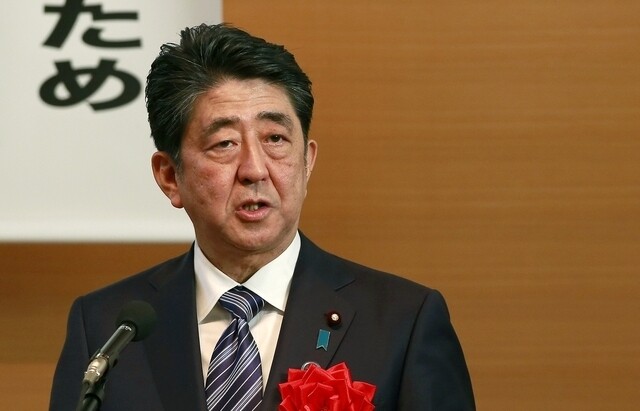hankyoreh
Links to other country sites 다른 나라 사이트 링크
S. Korea requests withdrawal of Japan’s export controls to WTO

The South Korean government stated before the World Trade Organization (WTO) that Japan’s recent export controls should be withdrawn as politically motivated measures based on inexact grounds. This marks the first time Seoul has officially addressed the issue of Japan’s trade-based retaliation before the international community.
The Ministry of Foreign Affairs (MOFA) and Ministry of Trade, Industry and Energy (MOTIE) announced that an explanation had been provided to the international community on the Japanese export controls’ illegitimacy during a meeting of the WTO Council on Trade in Goods in Geneva on July 8–9. On July 1, the Japanese government intensified control procedures on exports of hydrogen fluoride and two other items to South Korea, which entered implementation on July 4. The remarks by Paik Ji-ah, South Korea’s ambassador in Geneva, were made early in the morning on July 10 by South Korea time.
Paik characterized the Japanese export controls through intensified procedures for strategic goods as “baseless measures” according to the WTO agreement. Noting that Japan had argued the importance of a “free, fair, non-discriminatory, transparent, predictable, and stable trade and investment environment” while hosting the G20 summit on June 28–29, she sternly criticized it for its announcement two days later of export controls that directly conflicted with this same argument. Also emphasized was the potential impact in terms of severe global supply network disruption and negative effects on global trade as the Japanese export controls lead to reduced semiconductor and display production by South Korean businesses.
While agenda items presented before the WTO Council for Trade in Goods are typically discussed ahead of time, matters may be added in emergency cases. The South Korean government succeeded in appealing to the chairperson to have the Japanese export control issue added as an “emergency” agenda item at the time the council’s meeting was convened on July 8. The government reportedly opted for the emergency agenda-raising approach over preliminary discussions due to concerns of possible obstruction tactics from Japan.
The South Korean government also appears likely to continue denouncing Japan at a meeting of the WTO’s General Council on July 23–24. Analysts said it appears to have opted for an approach of pressuring Tokyo by appealing to international opinion first rather than attempting a practical countermeasure to Japan’s economic retaliation measures, with the aim of encouraging Tokyo to alter its stance by making the illegitimacy of its actions into a topic of international debate.
By Noh Ji-won and Choi Ha-yan, staff reporters
Please direct comments or questions to [english@hani.co.kr]

Editorial・opinion
![[Column] Season 2 of special prosecutor probe may be coming to Korea soon [Column] Season 2 of special prosecutor probe may be coming to Korea soon](https://flexible.img.hani.co.kr/flexible/normal/500/300/imgdb/original/2024/0426/3317141030699447.jpg) [Column] Season 2 of special prosecutor probe may be coming to Korea soon
[Column] Season 2 of special prosecutor probe may be coming to Korea soon![[Column] Park Geun-hye déjà vu in Yoon Suk-yeol [Column] Park Geun-hye déjà vu in Yoon Suk-yeol](https://flexible.img.hani.co.kr/flexible/normal/500/300/imgdb/original/2024/0424/651713945113788.jpg) [Column] Park Geun-hye déjà vu in Yoon Suk-yeol
[Column] Park Geun-hye déjà vu in Yoon Suk-yeol- [Editorial] New weight of N. Korea’s nuclear threats makes dialogue all the more urgent
- [Guest essay] The real reason Korea’s new right wants to dub Rhee a founding father
- [Column] ‘Choson’: Is it time we start referring to N. Korea in its own terms?
- [Editorial] Japan’s rewriting of history with Korea has gone too far
- [Column] The president’s questionable capacity for dialogue
- [Column] Are chaebol firms just pizza pies for families to divvy up as they please?
- [Column] Has Korea, too, crossed the Rubicon on China?
- [Correspondent’s column] In Japan’s alliance with US, echoes of its past alliances with UK
Most viewed articles
- 1‘We must say no’: Seoul defense chief on Korean, USFK involvement in hypothetical Taiwan crisis
- 2[Column] Season 2 of special prosecutor probe may be coming to Korea soon
- 3N. Korean delegation’s trip to Iran shows how Pyongyang is leveraging ties with Moscow
- 4Amnesty notes ‘erosion’ of freedom of expression in Korea in annual human rights report
- 5[Reportage] On US campuses, student risk arrest as they call for divestment from Israel
- 6Korea sees more deaths than births for 52nd consecutive month in February
- 7[Editorial] New weight of N. Korea’s nuclear threats makes dialogue all the more urgent
- 8‘Weddingflation’ breaks the bank for Korean couples-to-be
- 9[Column] Has Korea, too, crossed the Rubicon on China?
- 10[Column] Park Geun-hye déjà vu in Yoon Suk-yeol